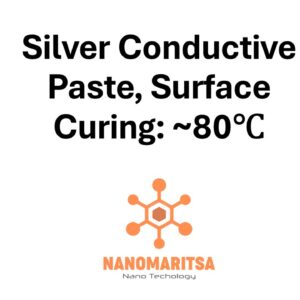Silver Conductive Paste is a specialized material used for creating electrically conductive connections in various applications. It consists of fine silver particles dispersed in a polymeric or resin matrix, forming a conductive medium when applied and cured. Here’s a detailed explanation:
1. Composition:
- Silver Particles:
- Provide excellent electrical conductivity.
- Silver is used because of its high conductivity and resistance to oxidation.
- Binder/Matrix:
- A resin or polymer that holds the silver particles together and adheres them to surfaces.
- Can include epoxy, acrylic, or silicone-based materials.
- Solvents and Additives:
- Solvents adjust viscosity for ease of application.
- Additives may enhance adhesion, flexibility, or curing properties.
2. How It Works:
- The paste is applied to a surface where electrical conductivity is needed.
- During curing (heating or air-drying), the solvent evaporates, and the binder hardens.
- This leaves a conductive silver network in the desired pattern or location.
3. Key Properties:
- High Electrical Conductivity:
- Enables efficient current flow.
- Thermal Stability:
- Silver’s properties ensure reliable performance in high-temperature environments.
- Adhesion:
- Bonds well to various materials like glass, ceramics, metals, and plastics.
- Flexibility:
- Some formulations are flexible, suitable for applications like flexible circuits or wearables.
- Oxidation Resistance:
- Silver does not oxidize easily, ensuring long-lasting conductivity.
4. Applications:
- Electronics:
- Repairing printed circuit boards (PCBs).
- Creating conductive tracks or interconnections in circuits.
- Solder replacement for delicate or heat-sensitive components.
- Flexible Electronics:
- Used in wearables, RFID tags, and flexible displays.
- Sensors:
- Conductive elements in medical, environmental, or industrial sensors.
- Antenna Fabrication:
- For RFID and NFC systems.
- Solar Cells:
- Forming conductive pathways in photovoltaic cells.
- Touchscreens:
- Used in transparent and conductive coatings.
5. Advantages:
- Low Curing Temperatures:
- Can be used on heat-sensitive materials.
- Customizability:
- Available in different viscosities for various application methods like screen printing, brushing, or dispensing.
- Ease of Use:
- No specialized equipment required for application.
- Durability:
- Offers long-term stability under various environmental conditions.
| Measurement (gr) | 25 grams, 100 grams, 500 grams, 1000 grams |
|---|



